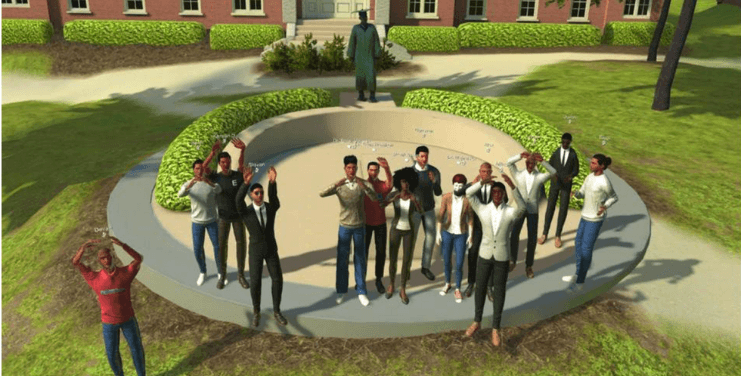Adapted from this week’s HBCU newsletter. Sign up NOW to make sure you get exclusive HBCU videos, news and analysis in your inbox every Wednesday morning.
Morehouse College has a new campus — and it is not in Atlanta.
It exists purely in the metaverse, which is a set of virtual spaces where users can interact with other people who are not in the same physical space. The campus can be accessed anywhere, as long as a person has a Meta Quest virtual reality headset.
For this reporter, that meant a virtual avatar of me was walking (or more accurately, transporting) across a digital re-creation of the Morehouse quad, then going inside the Ray Charles Performing Arts Center and finally visiting a chemistry lab all while I was physically sitting at my kitchen island.
The driving force behind this Morehouse “metaversity” is Muhsinah Morris, a chemistry professor at the historically all male college and director of the Morehouse in the Metaverse program.
After receiving funding and in-kind support from Qualcomm, Southern Company, and Meta (formerly known as Facebook), in spring 2021, Morris taught an advanced inorganic chemistry lab virtually to 12 students as part of a select few classes piloted in the metaverse. The course offerings have since expanded to include history, literature, microbiology and this fall, they will add business and entrepreneurship.
The detail with which elements of the latest iteration of Morehouse’s campus are virtually rendered is stunning — while on the quad, I could hear birds chirping in the background and clouds in the sky. In the auditorium, I could sit in the audience and watch something happening on stage. But the chemistry lab is where this project really shines (and what gets Morris very excited). The ventilation hoods have laminar flow, all of the cabinets open so students can put beakers and labeled chemical bottles inside, and the eye wash and showers work, too.
The goal of Morehouse in the Metaverse is to engage students in a way that other virtual or in-person learning couldn’t achieve.
“Using virtual reality is really the quickest way to bring people back to technology in a meaningful way, in a useful way. Give them emerging cutting edge skills, and give them the joy that they’ve been looking for,” Morris told The Plug.
Morehouse is not the only HBCU getting involved in the virtual world:
- In March, Clark Atlanta University was awarded an $11.8 million grant from EON Reality, an augmented and virtual reality company, to establish a Knowledge Metaverse Hub at CAU.
- EON Reality is also in a partnership with Meharry Medical College to give students virtual and augmented reality tools to enhance their medical training, although they did not disclose if a grant to the college was also awarded.
- Last September, Facebook announced it was investing $50 million over two years in global research and programs as the company works on “responsibly” building the metaverse. Among its global partners, Facebook has listed Howard University as the only school in America they are partnering with on this multi-million dollar investment.
Morris believes it’s important that HBCUs offer students opportunities in the metaverse because for too much of their history, HBCUs have been left behind.
“We’re getting in at a time where this is still new and they still have an opportunity to build,” Morris said. “My motto for our campus is to build the table. We don’t want a seat at anyone else’s table. We want to build it because I think our students deserve that.”
And it’s a lucrative table.
Though the metaverse is still in its infancy, one estimate says the global virtual reality market is expected to grow to $760 billion by 2026.
It is also estimated that by 2026, 25 percent of people will spend at least an hour a day in the metaverse for shopping, work, socializing or entertainment, according to Gartner.
If HBCUs are going to equip students for their future, teaching them about and in the metaverse will be required because this world — virtual and real — is changing.








